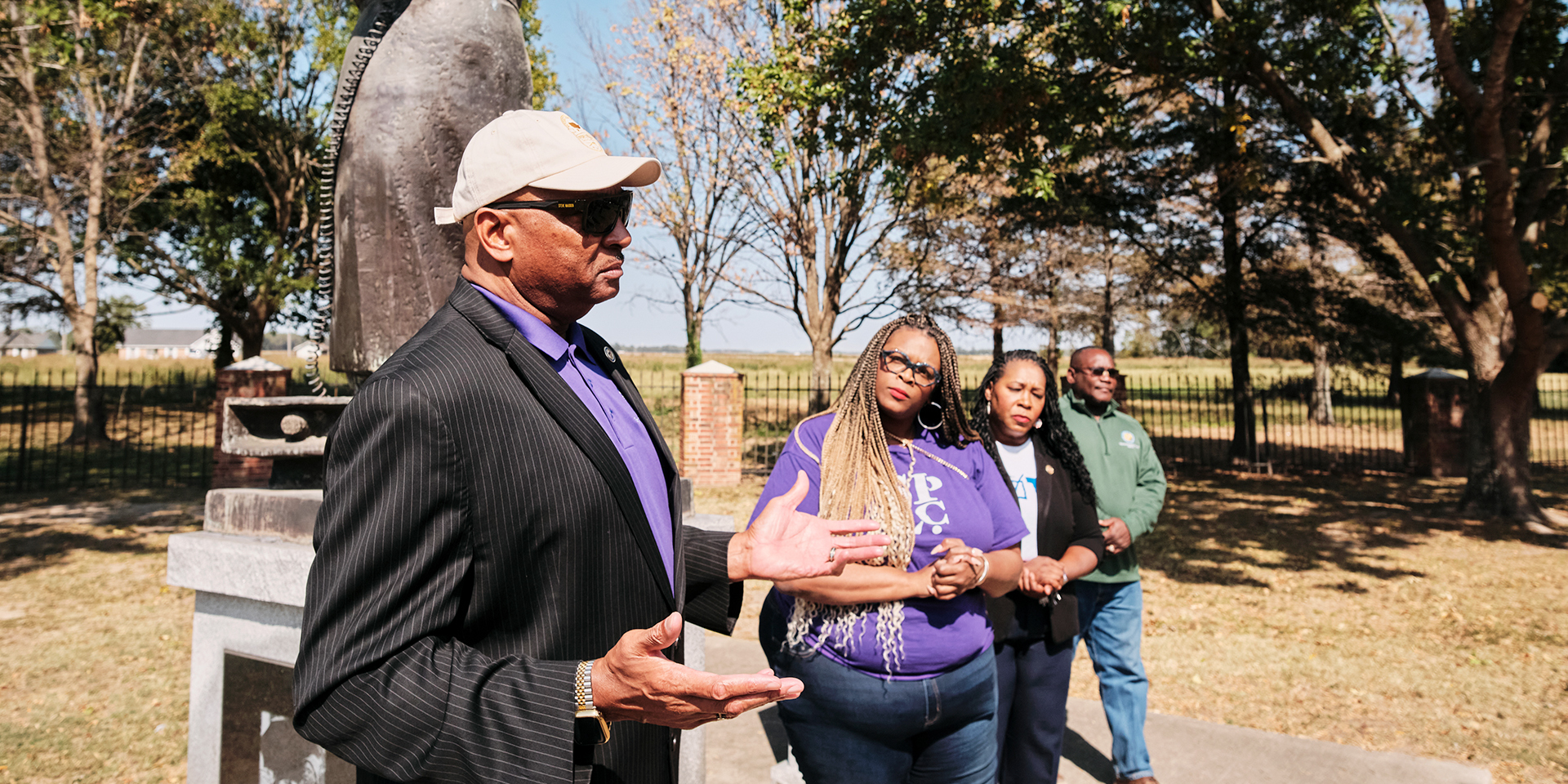For three days in October 2024, a bus crisscrossed the Mississippi Delta region carrying dozens of community leaders, legislators and representatives from aid groups, bringing them into rural communities where people who most need their services and leadership live.
That Southern Poverty Law Center outreach effort was so successful — and the challenges facing people in underserved communities so dire — that the second Truth, Poverty and Democracy Tour has expanded to five days, kicking off today in Jackson, Mississippi.
Attendees will sit in on a legislative hearing about the effects of the One Big Beautiful Bill Act (OBBBA) at the state Capitol before participating in several meetings centered on the quickly fraying social safety net and ways in which OBBBA is eliminating services and opportunities in rural communities.
“I think what we’re trying to do with this tour is connect people to resources,” said Waikinya Clanton, director of the SPLC’s Mississippi state office. “Knowing that these cuts are going to have a tremendous impact on people, it’s going to cause folks in our states to really have to make some hard life decisions. We want to make sure that we are positioning them to know where they can get opportunities for support, where they can go to access health care, where they can access food, where they can access political power.”
After the legislative introduction, people on the tour will travel to various cities across the region. The tour will stop in Utica and Flora for a one-day advocacy “boot camp,” while discussions in Natchez and Canton will center on workforce development and basic utility infrastructure. Stops in Drew, Olive Branch and Belzoni will focus on rural health, water distribution, food deserts, justice inequality and defending communities.
“People had been waiting for years to get assistance on rehabilitating their homes,” Clanton said. “We created a space for them to have that opportunity where we brought in navigators who can help them work through their applications. These are places where people are either technologically challenged or they’re technologically insecure. Being able to bring all of our resources into one place and allow them to access that in real time had, I think, a great impact on the people in the Delta.”
The last day of the tour will take place in Horn Lake, where people on the tour will take part in a voter registration canvassing across the city, which is located just across the state line from Memphis, Tennessee.
One key concern raised during the Belzoni stop on the 2024 tour, where the nearest hospital is at least 40 minutes away, was the dearth of rural health care options. The discussion culminated in the announcement that the city’s privately operated walk-in clinic would expand its operating hours.
Now, however, more rural hospitals like the one in nearby Greenwood are trying to figure out how they can remain open. Budget cuts outlined in the OBBBA may force even more rural hospitals — like Patients’ Choice Medical Center in Belzoni, which has been closed since 2013 — to either curtail services or shut down.
“I think about the state of our country and where we are and how these cuts are going to affect people in our state,” Clanton said. “We’re looking at more than 160,000 Mississippians losing health care coverage in a state that’s already struggling to expand Medicaid. We’re going to be facing a growing health care crisis. I should say compounded, a compounded health care crisis.”
The health care shortage in the 17-county Delta region goes beyond just hospitals. According to a 2021 GoodRx Research Team report, 58% of Mississippi’s counties do not have enough primary care providers to cover the local residents. Even after a state effort to boost primary care provider recruitment, 30% of residents still live in a primary care desert. Nationally, Mississippi ranks 49th out of 50 states in terms of access to clinical care.
The concerns, though primarily aimed at the rural areas of the Delta, also key in on the challenges in the state’s capital city of Jackson, where change is finally being seen — but only after years of a legislative siege that starved the city of resources.
“The work that we’re trying to do is to challenge those types of systems, dismantle them and create equitable opportunity for all the residents of Mississippi,” Clanton said.
“We’re working towards change every day,” she said. “That’s why we do the work around strengthening democracy, right?”
Image at top: Mississippi state Rep. Robert Sanders, left, speaks during a stop in Ruleville, Mississippi, on the Southern Poverty Law Center’s 2024 Truth, Poverty and Democracy Tour. Also shown are, from left to right, Waikinya Clanton, the SPLC’s Mississippi state office director; SPLC Mississippi community organizing manager Lolita Bolden; and Mississippi state Rep. Tracey Rosebud. (Credit: Dan Anderson)



